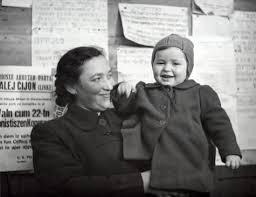“She Could Move Mountains”
 Rozalia Malec was born on March 13, 1900 – one of twelve children – in what is now Radziechow, Poland. Not much is known of her parents, her childhood, or her early life with her husband, Stanley Malec and their four children: Margaret, Gigi, Danuta and Lester. Rozalia’s story, it seems, begins in 1941 when the Russians invaded the Malec’s village in what was then a part of Germany.
Rozalia Malec was born on March 13, 1900 – one of twelve children – in what is now Radziechow, Poland. Not much is known of her parents, her childhood, or her early life with her husband, Stanley Malec and their four children: Margaret, Gigi, Danuta and Lester. Rozalia’s story, it seems, begins in 1941 when the Russians invaded the Malec’s village in what was then a part of Germany.
Like most of the people in the village, Rozalia and Stanley and their children were displaced and sent on a cattle train to Siberia. It is unclear why, but somehow on the journey, Stanley died, leaving Rozalia alone now with the children. Once in Siberia, she was forced to cut trees for which she was given a daily ticket for bread and water. She took her children with her into the forest to help her and to forage for any extra food they could find. The Malecs spent the rest of the war this way, and when it finally ended, they were again put on a train, this time bound for refugee camps in what is now Pakistan and Afghanistan. From there they went to a camp in India under English control and remained there until after India was liberated from the British in 1947. From India, Rozalia took the family to London, where they stayed for a number of years.
At some point in this tragedy, Rozalia’s oldest daughter, Margaret, escaped one of their internments, making her way back to Poland to join the underground. She drove ammunition trucks for the army in Poland and then found her way to Italy and finally the United States after the war ended. She and her husband were able to get a sponsor in America through a distant relative of her husband’s. Finally, in 1952, Margaret convinced Rozalia and the rest of the family to come to Chicago so that they could all be together.
Rozalia finally agreed and made the journey with her three children, all of whom had spouses and children of their own by now. They landed in New York first, where they stayed for several months, though they hated every minute of it. They eventually made the journey to Chicago where they were finally reunited with Margaret, meeting her husband and children for the first time. From that point, they all worked and saved money until they could buy a house big enough for them all to live.
A pattern quickly developed in which the adults all went out to work each day while Rozalia stayed home and watched all of the grandchildren, teaching them Polish and stories from the past as well as how to respect the country and culture they now found themselves in. She was always dispensing little bits of wisdom, her family reports. Besides tending to the children, Rozalia also did the cooking, the cleaning, the sewing, the baking, the gardening and volunteered at church. At the holidays, their house was always packed with people and food, music and laughter. One of Rozalia’s daughters, Danuta, recounts that her mother was the most positive person she ever knew – so active and truly “full of life.” Rozalia was always ready for anything, Danuta says. “She was one of those people who could truly move mountains.” All of her children report that despite what she had been through, Rozalia remained a very positive, loving, warm, caring person. “She was wonderful,” they all agreed.
Rozalia was nearly comatose when she arrived at a nursing home in 1995, at age 96. All of the above information was given to the staff by her children, as Rozalia’s only intelligible whispered words were “pray for me” and “pray for us.”
The post “She Could Move Mountains” appeared first on Michelle Cox.



